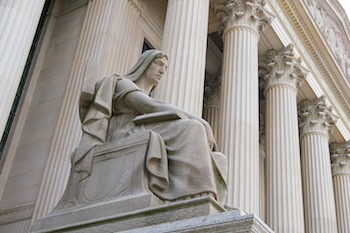 With the US Supreme Court agreeing to hear TC Heartland the perennial patent venue issue is front and center for patent reform in 2017. This case will attract much amicus, media, Congressional, law school, and fake news attention. It should influence how patent owners and litigation investors look at venue options in general and perhaps also with regard to growth markets like Germany and China. It will also tell us how the Trump administration thinks about patent issues.
With the US Supreme Court agreeing to hear TC Heartland the perennial patent venue issue is front and center for patent reform in 2017. This case will attract much amicus, media, Congressional, law school, and fake news attention. It should influence how patent owners and litigation investors look at venue options in general and perhaps also with regard to growth markets like Germany and China. It will also tell us how the Trump administration thinks about patent issues.
The annual year-end report of Chief Justice John Roberts on the Federal Judiciary, published at 6pm on December 31, 2016, does not mention venue or patents. This is both interesting and telling. In the coming months as a parade of horribles is trotted out and the popular narrative turns against patent owners everyone should remember that the Chief Justice did not see patent venue as a problem worthy of a single mention in his annual year-end report.
Roberts is very proud of the rapid impact of the procedural reforms introduced by the Judicial Conference to “encourage district judges to meet promptly with the lawyers after the complaint is filed, confer about the needs of the case, develop a case management plan, and expedite resolution of pretrial discovery disputes.” And in 2017 he looks forward to promoting the progress further by asking district judges to take part in programs testing case management techniques that can reduce discovery costs. This continues the “more discretion for judges” trend thanks to patent cases at the Court such as Octane Fitness + Highmark (fee shifting, loser pays) and Halo + Stryker (willful/triple damages).
The TC Heartland case, like other patent cases at the Supreme Court, will likely alter or delay Congressional action on what proponents advocate as patent litigation abuse reform legislation. The bills supported by President Obama along with many House and Senate Republicans and Democrats hinged on solving the venue issue. Single issue, venue only rifle shot bills were not permitted to proceed to a vote during the 114th Congress. The all or nothing approach to patent reform in previous years was an attempt to handcuff opposition and force unpalatable provisions through in order to get anything accomplished. Had a piecemeal approach been followed it is likely at least something could have been accomplished. But even a single-issue patent venue bill seems unlikely to move in the 115th Congress until the Supreme Court has spoken. Congress will simply not see the wisdom in taking what could be a difficult vote that could alienate some supporters when the Supreme Court may handle the issue for them.
The genesis of the patent venue “problem” is simple: Many patent infringement defendants complain about traveling to the Eastern District of Texas. They feel that it is too pro-patent, too pro-enforcement, or too difficult for defendants to win on a motion to dismiss. They also insult the people of Texas and rural courts in general by complaining that Marshall, Texas is too boring and remote. Of course, if you actually look on a map you will notice that the Eastern District of Texas abuts Dallas, Texas. It may not be San Francisco, Chicago or New York, but few places are. The people in the Eastern District of Texas are not the “hicks” most have been lead to believe they are. They just happen to live in what many elites would consider fly-over country.
Many commentators on the 2016 election talk up Trump winning the “heartland” insofar as his dominance of rural counties. Trump won all 43 of the counties that are in the Eastern District of Texas. Marshall, often considered the epicenter of patent litigation in EDTX, is about 150 miles east of Dallas, the home of one of the satellite patent offices created by the Leahy-Smith America Invents Act and signed into law by President Obama. (That’s Rep. Lamar Smith, Republican of Texas, by the way.) EDTX generated its expertise in patent cases thanks to Texas Instruments bringing patent cases there instead of its hometown of Dallas. TI was in bankruptcy and used its patent licensing revenue to save the company from unfair overseas competition and efficient infringement at home. Predictability and speed in court proceedings was existential for the company. Dallas courts were clogged with criminal cases. Neighboring EDTX was not. The story goes that judges in Dallas recommend to TI that they go to Marshall as they were not so busy.
In 2014 Texas Monthly highlighted that political opposites Justice Scalia and President Obama agreed that EDTX is a “renegade” jurisdiction. Yes, it is true that EDTX enjoys hearing hundreds of patent cases, many more than other district courts. The infringer lobby makes this point impossible to escape. But it is also true that such paltering is worse, especially in today’s world of fake news. Would saving the iconic technology giant Texas Instruments based on enforcement of private property rights be deemed renegade activity by the Solicitor General arguing TC Heartland for President Trump?
Patent owners have resisted venue reform because it has largely felt like infringers were trying to foreclose the one district court where they were given a fair chance to prevail. Trial lawyers too have resisted venue reform out of fear of a precedent being set by patent litigation.
If the Supreme Court overrules the Federal Circuit’s decision in TC Heartland and dramatically restricts where patent infringement cases can be brought, everyone may demand Congress take immediate action. Many of the most frequent defendants who fund the infringer lobby are also patent owners. The thought that they could only realistically sue on the home turf of defendants would likely be too much for them to give away and create a new material risk for shareholders. This is likely to become an increasingly complicated calculation as more companies onshore jobs in response to the policies of the Trump administration. GM’s stock, for example, dropped a point in response to Trump’s tweet on taxing the Chevy Cruz hatchback made in Mexico and imported into the US.

![[IPWatchdog Logo]](https://ipwatchdog.com/wp-content/themes/IPWatchdog%20-%202023/assets/images/temp/logo-small@2x.png)


![[Advertisement]](https://ipwatchdog.com/wp-content/uploads/2024/04/Patent-Litigation-Masters-2024-sidebar-early-bird-ends-Apr-21-last-chance-700x500-1.jpg)

![[Advertisement]](https://ipwatchdog.com/wp-content/uploads/2021/12/WEBINAR-336-x-280-px.png)
![[Advertisement]](https://ipwatchdog.com/wp-content/uploads/2021/12/2021-Patent-Practice-on-Demand-recorded-Feb-2021-336-x-280.jpg)
![[Advertisement]](https://ipwatchdog.com/wp-content/uploads/2021/12/Ad-4-The-Invent-Patent-System™.png)







Join the Discussion
2 comments so far.
Paul F. Morgan
January 10, 2017 11:32 amIf there was even any actual agreement among leading members of Congress as to specific patent venue reform legislation language that they could agree on, I have not seen it.
The Sup. Ct. taking cert in this case is far more likely to have to do with the mistrust the Sup. Ct. has developed in Fed. Cir. decisions in recent years. The Fed. Cir. decision in question here had strangely rendered almost entirely moot a specific patent venue statute Congress had left on the statute books, with consequences not appreciated at the time.
As to defendant dislikes of the majority of all patent suits being filed in E.D.TX, a far more important dislike, I hear, is allowing costly unrestricted discovery to continue to force pre-trial settlements [in all but 12 cases last year] long before ever getting a Markman hearing that could establish the actual products scope of the claims properly subject to discovery or even clear non-infringement. Especially with one judge in particular having a huge docket of patent cases.
Thus, would not patent reform legislation that would require early Markman claim interpretations be far more effective than venue reform?
Bemused
January 9, 2017 11:33 amPeter/Gene: Very good article on the politics of venue reform and the TC Heartland case. What is interesting to me is that I’ve regularly seen technology companies and medical device makers filing suit in the EDTX as plaintiffs. Ostensibly, because the judges in that forum know patent law. Perhaps someone should take a look/write about that fact before SCOTUS changes venue law to benefit the infringer lobby.